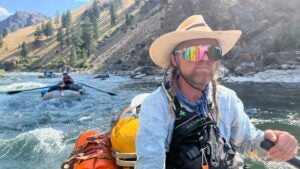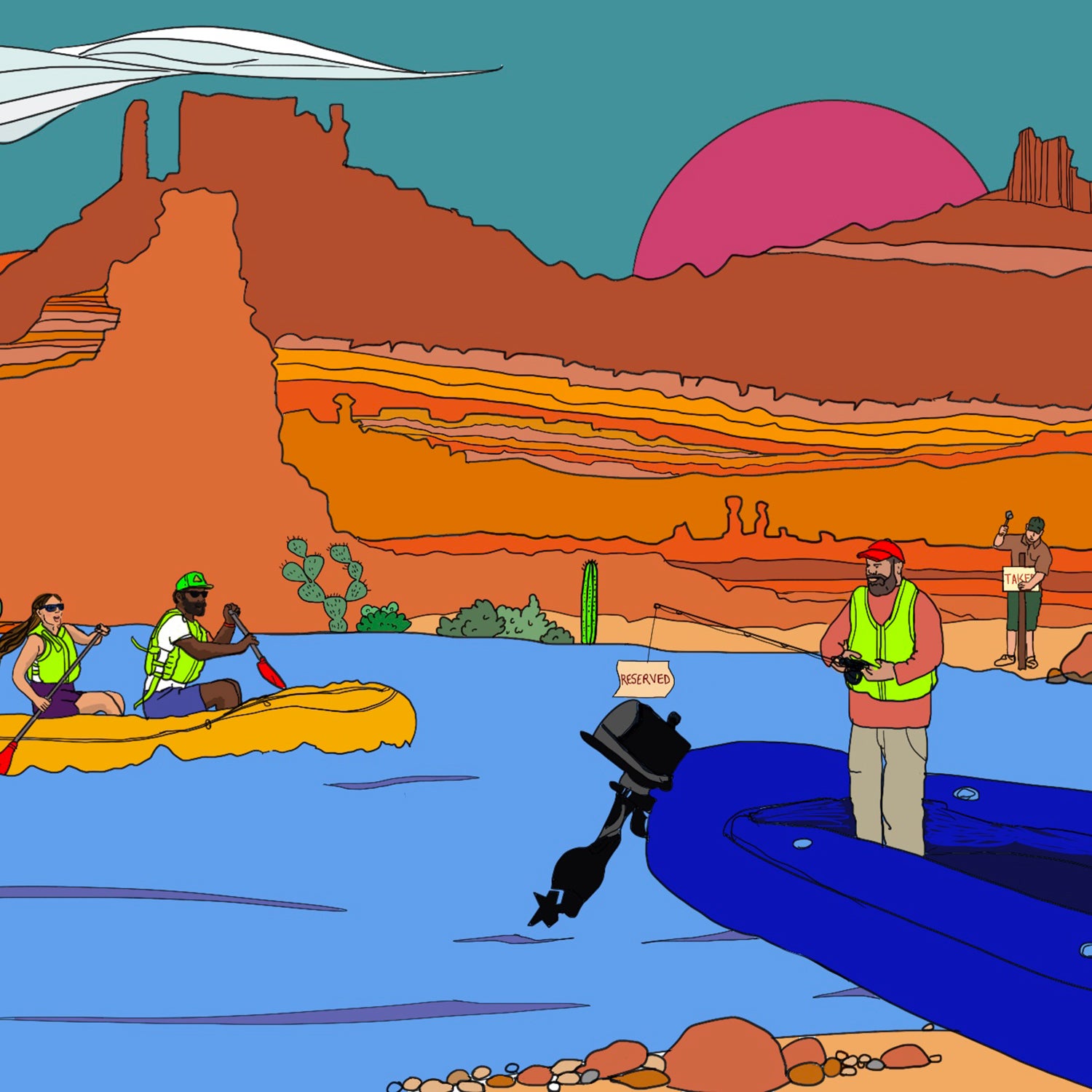Dear Sundog: Floating down Desolation Canyon in Utah on a private trip, pulling the oars against the upstream wind, we were passed by commercial rafts lashed together buzzing their motors to snag the primo camps. I know it’s bad form for parties to send a boat ahead to steal a camp, but this situation just demanded some sort of justice. Is it OK to break the rules to combat the commercial guide domination? —Perplexed Rower Offended by Boating Ethics
Dear PROBE: As your letter notes, the practice of splitting up a river group to “camp run” downriver is morally murky. It breeds cutthroat competition, with boaters racing each other for a shady beach instead of chilling the F out while floating lazily down the current the way the Creator intended. On many permitted river sections, the practice is explicitly banned, enforced with the threat of a ticket written up by river rangers—what Sundog used to call “paddle pigs.” What’s more, it’s downright foolhardy: if someone in the upstream group has a medical emergency, a blown valve, or simply can’t hack the wind, then some of the group may spend the night separated from food, groovers, and first-aid kits.
Yet Sundog’s area of expertise is not legality or foolhardiness—it’s ethics—and the fact of some activity being forbidden and stupid doesn’t make it unethical.
PROBE, these are desperate times trying to get to the river. The COVID recreation boom, combined with the online ease of applying for permits, has made it nigh impossible to win the “lottery” and float the big rivers. Perhaps this onerous process before the launch is what ratchets up the battle for the best camps. The behavior you describe by the commercial guides is, though not illegal, extremely irritating. Motoring past hard-working rowers and paddlers all but guarantees that the loudest polluters get the best camp. Ethical guides would cut their goddamn Evinrudes, and call out, “Hey, which camp were you hoping to reach tonight. We’ll be happy to skip that one so you can have it.”
Likely ain’t gonna happen. So we’re left with deciding how we can best behave. On canyons like the Gates of Lodore where sites are limited, boaters are required to sign up for camps and stick to that itinerary. Sundog finds this a Draconian fix, as it takes away from the sense of spontaneity and timeless drift that attracts him to rivers in the first place.
On the Salmon River, all parties are required to talk it out, perhaps hug, and decide who will camp where on which night. It’s a good idea. Sundog is aware of at least one instance in which commercial guides welched on their word and stole a camp from a private party, who made a point—justified, I’d say—of repaying them in kind the following night. However these shenanigans are precisely what motivates the paddle pigs to write more rules and regulations.
In your case, PROBE, the best practice would be to flag down the motor-rig and have a conversation to try to avoid the steal in the first place. If that fails, and your camp is taken, I suppose it is ethical to break the rules in order to fight what is otherwise a losing battle. But it’s a slippery slope, because when you set out to grab a camp from an outfitter, you’re just as likely grabbing it from another private party in front of you, which makes you the jerk.
Your question does raise another issue, which is why are motors allowed on a stretch of river in a designated wilderness that for at least a portion is labeled Wild and Scenic. The most obvious answer is the first 25 miles of windy flatwater. Difficult, sure, but boaters without motors have made their way through for over a century now. The longer answer is that motors allow outfitters to sell the 86-mile canyon as a 5-day trip, while muscle-powered expeditions take a few days longer. There is some rich irony in the well-intentioned leave-no-tracers straining their dishwater to avoid contaminating the river while a few yards from shore outboard motors spew oil and gas directly into the fishes’ living room.
In a column about being a surfing tourist in Mexico, Sundog suggested re-examining our beliefs about globalization. A reader, Stan Weig, responded:
I was intrigued by your recent column on “Yankee Imperialism” and Mexico travel, as I just returned from a five week drive to Cabo San Lucas and back. I have traveled to Baja since the ‘60s, in everything from a pickup camper to a really nice motorhome. And a 747.
While I respect the need to be nice to the subscribers that write in, I suggest your “middle-of-the-road” was too soft on the self-centered Rich White Yankee Surfer guilt trip of your advice seeker.
Not everybody likes the huge condos, raucous tourist bars and t-shirt shops of Cabo—I don’t—and if your reader doesn’t like it, don’t go. But it’s more about preferences than an ethical quandary about globalization. I don’t particularly care for Miami Beach either. However, San Juan de Cabo is just to the north of Cabo and has a very different vibe and a well preserved old town—go there and rest easy.
Tourists are a cash crop, and the folks running the sushi restaurant that she deplores, renting the beach chairs, and driving her around in a rental car made in Mexico and owned by Mexicans, are local entrepreneurs raising and harvesting that crop. Indeed, one could argue that in the good old days when we traveled from the high ground of Yankee prosperity down to “unspoiled” poverty of Mexico we were taking advantage as well.
Your advice to research and support local business was right on. If she doesn’t want to support globalist capitalists, she ought to be doing that here at home too. By the way, the reader may not know that while development along the beach may have been built with expat dollars, the ownership is required to be at least 51 percent Mexican. And she may not be aware of the government mandated efforts to ensure that local interests are at least somewhat protected during development. For example, perhaps the nicest beach in the Cabo area for sunning, swimming, and snorkeling is Chileno Beach. Right next to it is a huge new (and expensive!) resort—but access to the beach is free, there are nice restrooms, showers, and a lifeguard; and any of the locals that want to can take their kids and a cooler down to the beach for the day.
When we visited Todos Santos 35 years ago, the fabled Hotel California was shabby and in disrepair and all the side streets were pot holed dirt. Now the hotel is nice, locally run restaurants abound, local artists successfully compete with Made in China souvenir shops, and the streets are paved—so maybe tourism ain’t so bad.
Got a question of your own? Send it to sundogsalmanac@hotmail.com.

Mark Sundeen, aka Sundog, worked as a river guide for 11 years. These days he thinks young guides have a bit of attitude that they own the whole river, and he is happy to poach their campsites if the situation warrants it.


